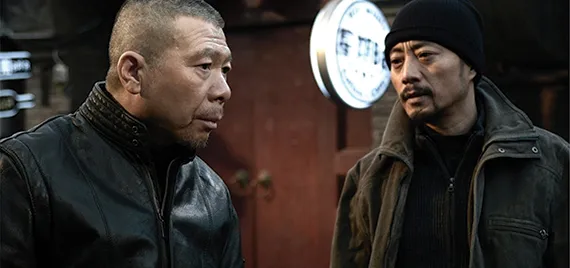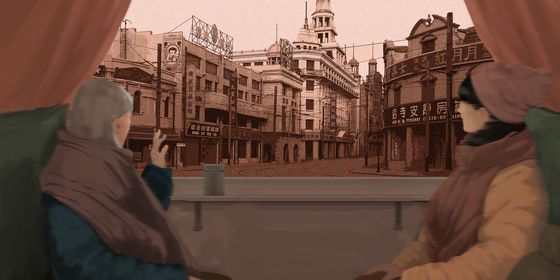Old Beijingers are not to be messed with
“There are such things as rules!” Mr. Six growls as he knocks the daylights out of a hapless thug, proceeding to drag him to the floor with a hammerlock. That kind of quick violence is surprising, considering that at the outset of the eponymously-titled film Mr. Six (老炮儿) is meant to be one of the archetypal old guys wandering the Beijing back alleys—seemingly harmless old men who witlessly scratch at their bare bellies in the summer and are often found at the open air tables over owing with empty beer bottles. “I’m just a regular old guy,” he drawls. Six operates a little convenience store out of the back of a hutong alley and spends his days affixed to the little Beijing street he’s lived on for what seems like eternity.
Maybe it’s precisely this “regular-old-guy-ness” that makes Mr. Six particularly inviting. Gangsters in Chinese culture date back to ancient legends, but they aren’t always bad people and are certainly capable of bad-ass acts of derring-do. Six just happens to have been one of the baddest gangsters of his day, the perfect set up for the conflict to come. Directed by Guan Hu (管虎), Six is not just a character study into the archetypal “old dude”, but also a commentary on their place (or lack thereof) in modern society.
Six, played by veteran actor and director Feng Xiaogang (冯小刚), is caught up in a wave of crime that involves his son Xiaobo, a befuddled young man who accidentally scratches the million-dollar Lotus of the latest hoodlums on the block—young street-racing thugs. Their rich, perfectly-coiffed man-boy leader, Xiaofei, played by Kris Wu (吴亦凡), looks more like a model than a gangster. As repayment, he orders Xiaobo’s kidnapping, and demands ransom for his return.
To make matters worse, Six has been diagnosed with heart disease, another mortal chink in his legendary armor. Six, up until this point, tries to be reasonable and pay the ransom off, but when things go south, there’s a moment when we see him undergo a transformation from has-been to the thug of local lore. The third act of the film portrays Six’s psychological build up in anticipation of the final showdown of the film, a fight to the finish on the frozen lake of the summer palace.
 Xiaobo (Li Yifeng) returns home and his father, Six (Feng Xiaogang), talking to his lover Huaxiazi (Xu Qing)
Xiaobo (Li Yifeng) returns home and his father, Six (Feng Xiaogang), talking to his lover Huaxiazi (Xu Qing)
While the 137-minute drama tends to weigh down in some places—the third act tends to get caught up in Six’s philosophizing. And yet, Mr. Six levels some hard accusations at modern Chinese society: old warriors and their codes of honor have been discarded by greedier, more materialistic younger generations; no country for old men. As if that point wasn’t made clear enough, in one scene, Six sits in a chair, entranced by an ostrich that prances its way across the street. The absurdity is clear: Six and his fellow brothers-in-arms don’t have much of a place left in this modern society. Set up this way, the story plays out like a modern King Hu or Shaw Brothers wuxia opera: teach the brats a lesson in respect and go out with a bang.
Director Guan Hu manages to stitch all this together in a nuanced and sublime cutting-room job. In a world where explosions and fast cars reign supreme (a dig at the concurrent box office runner Furious 7), the long pauses, saxophone-dominant score, and silver-screen magic of Feng Xiaogang evoke the sense of a burned out shell; a melancholy epitaph of a great warrior and era long gone, but also a style of movie-making, long gone.
Though shot in the same bleak war-like contrast as Saving Private Ryan where every dimple, and skin blemish is magnified, and the harsh, blue overtones of winter, the simplicity of Mr. Six is still refreshing and thoughtful. If nothing else, on the next long walk through the hutongs of Beijing, it makes one think twice about arguing with the old men.
“Mr. Six” is a feature story from our newest issue, “Internet Superstar”, coming soon. To read the whole piece, become a subscriber and receive the full magazine. Alternatively, you can purchase the digital version from the iTunes Store.












